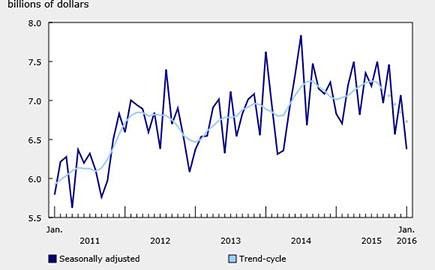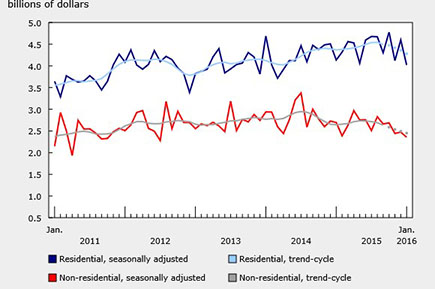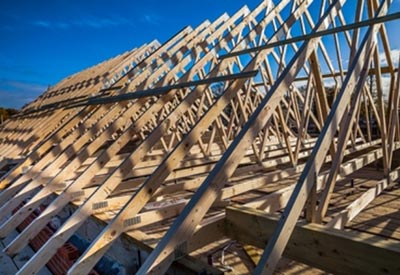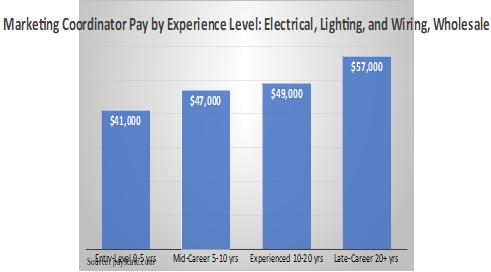Value of Building Permits Drops 9.8% in January

March 15 206
Municipalities issued building permits worth $6.4 billion in January, a decline of 9.8% from the previous month. This decline, which followed a 7.7% increase in December, was largely due to lower construction intentions for multi-family dwellings in British Columbia and Ontario and, to a lesser extent, institutional buildings in Quebec and Alberta.
Chart 1: Total value of permits
The value of residential building permits fell 12.5% to $4.0 billion in January, following an 11.5% increase the previous month. Declines were posted in seven provinces, led by Ontario, British Columbia and Alberta. Nova Scotia, Saskatchewan and New Brunswick recorded advances.
Municipalities issued $2.4 billion worth of non-residential building permits in January, down 4.8% from a month earlier. Declines were registered in seven provinces, led by Quebec and Saskatchewan. Gains were reported in Ontario, Alberta, the Northwest Territories and New Brunswick.
Residential sector: lower construction intentions for multi-family dwellings
The value of permits for multi-family dwellings fell 21.0% to $1.8 billion in January, following a 27.7% gain in December. Declines were reported in six provinces, led by British Columbia, Ontario, Quebec and Alberta. Nova Scotia reported the largest advance.
Construction intentions for single-family dwellings were down 4.1% to $2.2 billion in January. The value was fairly stable at around $2.3 billion for the last four months. Gains in five provinces were not sufficient to offset the notable decrease in Ontario.
Municipalities approved the construction of 15,704 new dwellings in January, down 13.2% from the previous month. The decline mainly resulted from multi-family dwellings, which fell 18.4% to 10,194 new units. Single-family dwellings were down 1.8% to 5,510 new units.
Chart 2: Residential and non-residential sectors
Non-residential sector: decrease in institutional and commercial construction intentions
Institutional construction intentions were down 20.2% to $573 million in January, the third consecutive monthly decline. Lower construction intentions for educational institutions, nursing homes and other government buildings accounted for the majority of the decline. Increases in five provinces were not sufficient to offset the notable decreases in Quebec, Alberta and Saskatchewan. British Columbia, the Northwest Territories and New Brunswick recorded the largest advances.
The value of commercial permits fell 7.1% to $1.3 billion in January, following a 12.5% increase in December. Lower construction intentions for retail complexes and storage buildings accounted for the majority of the decline. Decreases were reported in eight provinces, led by Ontario. The only provinces to post gains were Alberta and New Brunswick.
Industrial construction intentions were up 30.6% to $521 million in January, following a decline of 12.9% in December. The advance at the national level was largely the result of higher construction intentions for maintenance and transportation-related buildings. Increases were posted in five provinces, most notably Ontario and Alberta.
Provinces: Ontario, British Columbia and Quebec post largest declines
The total value of building permits was down in eight provinces in January. Ontario posted the largest decline, followed by British Columbia and Quebec.
The total value of building permits in Ontario was down 10.8% to $2.5 billion in January, following an 8.8% increase in December. The decline was largely attributable to lower construction intentions for single-family homes, multi-family dwellings and commercial buildings.
In British Columbia, the value of building permits fell 11.1% to $1.2 billion in January, following an increase of 11.3% the previous month. Lower construction intentions for multi-family dwellings and commercial buildings offset gains reported in the other components.
In Quebec, the value of building permits declined 11.7% to $973 million, after edging up for two consecutive months. Lower construction intentions were reported for every component other than single-family homes. The decrease was largely attributable to multi-family dwellings, institutional structures and commercial buildings.
Lower construction intentions in most census metropolitan areas
In January, the total value of building permits was down in 22 of the 34 census metropolitan areas, with Toronto registering the largest decrease, followed by Calgary and Vancouver.
In Toronto, the value of building permits was down 19.7% in January compared with one month earlier. Lower construction intentions were reported in every component other than industrial buildings. The value of permits for single-family homes led the decline, followed by multi-family dwellings and institutional structures.
In Calgary, the value of building permits declined 37.8% in January as a result of lower construction intentions in all components, excluding institutional structures. The largest decreases were reported for multi-family dwellings and industrial buildings.
Construction intentions in Vancouver were 13.8% lower in January compared with one month earlier. The decline in the value of building permits was largely due to multi-family dwellings.
Source: Statistics Canada, www.statcan.gc.ca/daily-quotidien/160308/dq160308a-eng.htm.












